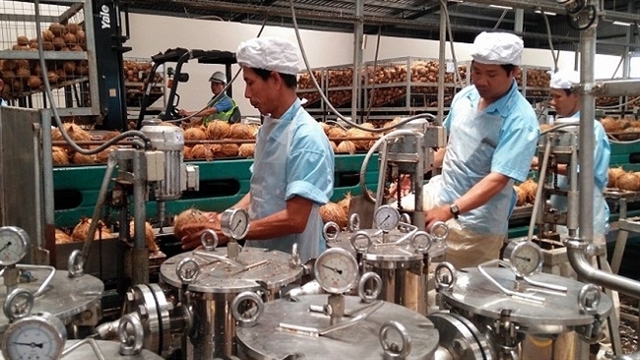 Economy
Economy


|
| Coconuts processed at Bến Tre Import Export Joint Stock Company (Betrimex). — Photo betrimex.com.vn |
Compiled by Thiên Lý
Trần Hoàng Quân of HCM City’s Tân Bình District quit his very good job at a giant foreign-invested beverage company and set up an establishment to produce fresh fruit juices in the neighbouring province of Bình Dương.
Asked why he chose to risk all, he said the beverage market has great potential to develop, especially the bottled fruit juices segment.
“So, I do not want to miss this opportunity,” he said.
Surveys by global market research companies confirm Quân’s belief.
Euromonitor International expects Việt Nam’s beverage industry to be worth US$5.8 billion this year and achieve annual growth of 6.3 per cent from now until 2023.
According to a Nielsen report, 56 per cent of Vietnamese consumers are under 30 years old and Việt Nam’s middle class will double from 12 million in 2014 to 33 million in 2022. It is estimated that the country will have 95 million people joining the middle class by 2030, the fastest-growing in any economy in Asia.
The middle class is loosely defined as people whose average daily spending is $15, 30-40 per cent on beverages and food.
A majority of consumers prefer soft drinks processed from fresh fruits.
The Ministry of Industry and Trade also forecasts the food and beverage industry to grow at 5-6 per cent in the next five years (2021-2025).
Food and beverage are classified in the group of fast moving consumer goods that are sold quickly and at a relatively low cost.
Việt Nam’s major export markets such as Southeast Asian countries and China are all seeing high growth in food and beverage consumption. A series of free trade agreements means Vietnamese food and beverages have been largely able to access them without tariffs or with very low tariffs.
Realising these advantages, more and more investors are keen to inject money into the industry.
Five years ago Bến Tre Import Export Joint Stock Company (Betrimex), for the first time in Việt Nam, introduced coconut water products under the Cocoxim brand name.
The product has contributed to changing people’s habit of consuming coconut water, and also created a new export product for the country, analysts said.
But the company managed to remain a monopoly in fresh coconut water products for only a short while before many similar products entered the market, including Vietcoco from Lương Quới Coconut Company and Coco Fresh from dairy giant Vinamilk.
Most of the new products are cheaper as they seek to gain a competitive advantage in the market.
There is fierce competition not just in the packaged coconut water segment but across the entire bottled fruit juice industry.
Many large dairy and pharmaceutical firms have entered the industry and hope to quickly expand their market share.
TH Group is a typical example, launching what it claims are all-natural fruit juices, fruit milks and rice milks late last year and early this year.
To survive in such as a competitive situation, analysts said fruit juice producers should focus on diversifying products and invest in packaging to ensure that all information related to the products, especially their freshness, is clearly provided.
For small enterprises, it would be easier to compete with large ones with famous brands if they focus on niche markets and fully tap their competitive advantages, the analysts said.
With change to review periodicity, fuel prices likely to track global rates
On November 26 the price of E5 RON92 bio-fuel was increased by VNĐ609 per litre to VNĐ14,494 (US$0.63), and RON95-III by VNĐ650 to VNĐ15,351.
Diesel 0.05S and kerosene are up VNĐ596 and VNĐ576 to VNĐ 11,434 and VNĐ 10,138.
The hikes were made following a review of retail fuel prices by the ministries of Industry and Trade and Finance, which are mandated to do so every 15 days to ensure domestic rates are in line with the global market.
They said the price of petrol and other fuels have been rising strongly in the global market in recent days, and so local prices need to be adjusted.
But the six-year-old Decree No 83 under which the review is done needs to be amended, they said. The current 15-day frequency for review and adjustment of petrol prices is inadequate, and often causes a big gap between domestic and global prices, they pointed out.
This frequently causes an imbalance between supply and demand when petrol traders cut supply to reduce their losses.
This problem has been especially serious in recent times since global prices have been seeing huge volatility while local prices do not keep pace, according to a ministry official.
The ministry has recently submitted a proposal to the Government to amend the decree, he said.
It includes a change to the time frame for reviewing the retail prices to the 1st, 11th and 21st of each month, meaning the frequency of review and adjustment if necessary will be reduced from 15 days to 10.
The dates are also optimal to collect price data from enterprises to calculate the monthly changes to the consumer price index, he said.
But experts said having fixed dates for the review is not a good idea since it causes difficulties during months that have 28, 29 or 31 days.
Instead, they said, the review and adjustments should be made once every 10 days. VNS




